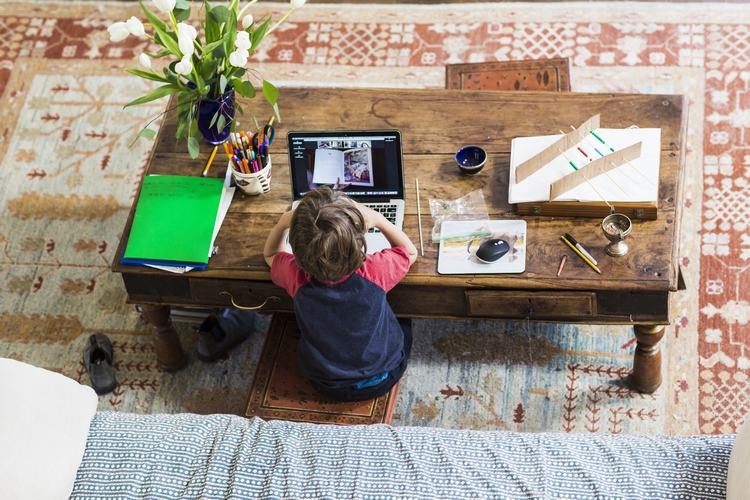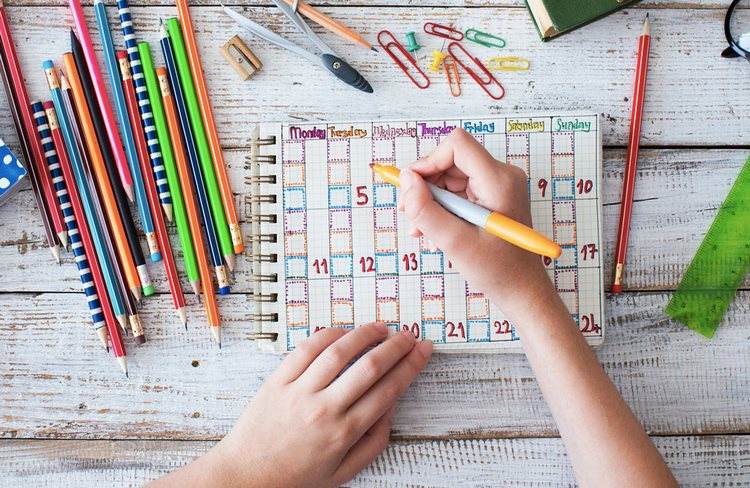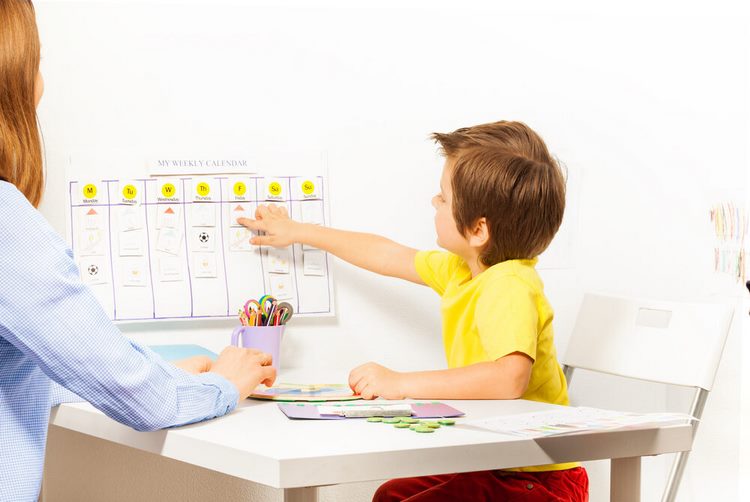We have prepared some effective homeschooling tips for parents that will help you organize and keep a daily schedule if schools are quarantined due to possible problems with the coronavirus. How to properly organize the time of the children during distant learning? Many people, who went through COVID quarantine and online education have already been through this and realize that they need to pay extra care and attention to the daily schedule of the kids. On the first place, this helps the child not to feel like a prisoner within four walls and in addition helps avoiding stress. Another fear of many parents is the long hours that children spend in front of the computer. This means that adults should think of various ways to engage kids in physical activities which will distract them from lessons.
Homeschooling tips for parents – why the daily schedule is important?
Homeschooling is different from going to school. It is important to maintain a daily routine for the child. Plan the school day, keep in mind regular breaks, communication with friends and do not allow the child stay in pajamas during the day. The child must keep the usual school routine to which he will one day have to return.
Why is a daily routine necessary? Many books and articles have been written about the importance of daily routine. The schedule helps the children pay attention, stay focused and work better. According to scientists, when the routine is observed, this makes it easy to switch from one activity to another. It also maintains a balance between work and rest.
In a regular school, the schedule is built automatically: the beginning and end of classes are clearly fixed. With homeschooling children often lose their daily routine. What could be the consequences?
- Lack of working mood in the morning
- It may seem to the child that since the lessons are taking place online, then he can get up from bed five minutes before the first lesson begins, because he does not need to go anywhere. However, the brain has to prepare itself to master the new educational material. To do this, the child needs to have time to wake up, have breakfast, breathe fresh air, and cheer up. The absence of all these rituals usually leads to lack of attention and ineffective learning.
- Failure to do homework
- The lack of a daily routine for a student makes the child spend the day chaotically, doing what he wants or doing nothing at all. As a result, there is no time left to complete homework or assigned tasks and projects.
- Low concentration of attention
- Before going to bed, teenagers often “hang out” with friends on social networks and fall asleep late at night. As a result the lack of sleep leads to loss of concentration and lack of attention during lessons. It will take more time and energy to study than if the student had had a good rest.
To avoid all these problems, you should follow the rules for organizing homeschooling daily schedule of your children.
Homeschooling tips for parents – how to organize a daily routine
When we talk about homeschooling tips for parents, we have to point out that organizing a daily routine according to the principles of time management begins with determining the priorities. What does it mean? For example, if the main occupation of a teenager is study, then the most productive part of the day should be devoted to lessons. Here are some simple rules to follow:
Make a daily class schedule. A colorful schedule will not only cheer the child up, but will also help him know with which teacher and at what time to get in touch. There are many Lesson schedule templates on the Internet and you can print one or make one together with the children. Make sure that each child has a schedule of his own.
Teach your child the basics of online etiquette. The student must know the rules of online communication with the teacher and classmates while studying. It is the parent who has to teach the child how to behave on the Internet! We recommend that you print a poster that will always remind these rules to the child.
Encourage your child to record their progress. This is a great way to monitor how children cope with distant learning. Hang a board on the wall where the child can write down his achievements. For example, a child solved examples in mathematics without mistakes, successfully passed the test in English or learned a poem, etc. In this way children will look at their successful achievements and will be proud of themselves.
Reward your child for doing well. The child should be rewarded for doing well. For example, a favorite treat, a home pizza party or a home movie night, etc. In case the child fails or has difficulties, try to understand what the problem is instead of punishing him.
Remove distractions. Put away toys and games and make sure that pets have no access to the home schoolroom during classes.
Keep in touch with teachers. Be always aware of what’s going on during home schooling. Talk to the teachers periodically to learn about your child’s progress and behavior.
Get up and go to bed at the same time. A student needs to sleep at least 8-9 hours. Experts advise that children should not play or sit at the computer at least an hour before bedtime. This will make it easier to get into rest mode. There should be at least 60 minutes between getting up and studying. During this time, the child will have time to wake up, have breakfast and get ready for classes.
Choose clothes for school. Explain to your child that they should not sit in pajamas all day. Changing into suitable clothes sets the mind to working mode. Choose convenient clothes together with the child. After the end of the lessons, the child can change back into his favorite T-shirt.
Prepare healthy snacks and water in advance. Children often forget that they need to drink water. Put a bottle of water within reach. Make sure that you have some healthy snacks for the child for the break periods. However, make sure that children do not eat lunch while in class. A schoolchild can have lunch during a break.
Breaks and rest. Remember that your child needs to rest from the monitor. During the breaks children can go out onto the balcony to get some fresh air, have a snack, go to the bathroom, play with your beloved pets, etc.
Communication with friends and classmates. School is not only a place to study, but also to socialize. It is important for a child to communicate with other children. For example, during quarantine, when there is no way to see friends, let your child call his friends on the phone or internet. The child should have time to talk to his friends but this should not occupy too much of his free time. It is best if they do that after they have done their homework.
Physical activities and house chores. Children are very active, so you need to think about physical activities. Some light exercises would be great for the children. Make sure to include house chores to the daily routine of your children. They should be appropriate for their age, but will guarantee not only the physical activity of the child but will be beneficial to the whole family. Tiding up their room, helping with dinner, dusting, etc., there are many chores that children can help with.
Obviously, the daily schedule will depend on the age of the child. Here is an example that you can use as a guideline:
- 8:00 am Getting up and getting dressed
- 8:30 am – Breakfast
- 9:00 am – School starts
- 12-12.30 -Lunch
- 2:00-3:00 pm – School ends
- 3:30 pm – Chore time
- 4:00 pm -Free time, physical activities
- 4:30-6:30 pm – Doing homework
- 7:00 pm – Eating dinner
- 8:00 pm – 10 Minute tidy and preparing for bed
- 8:30-9:00 – Bedtime













